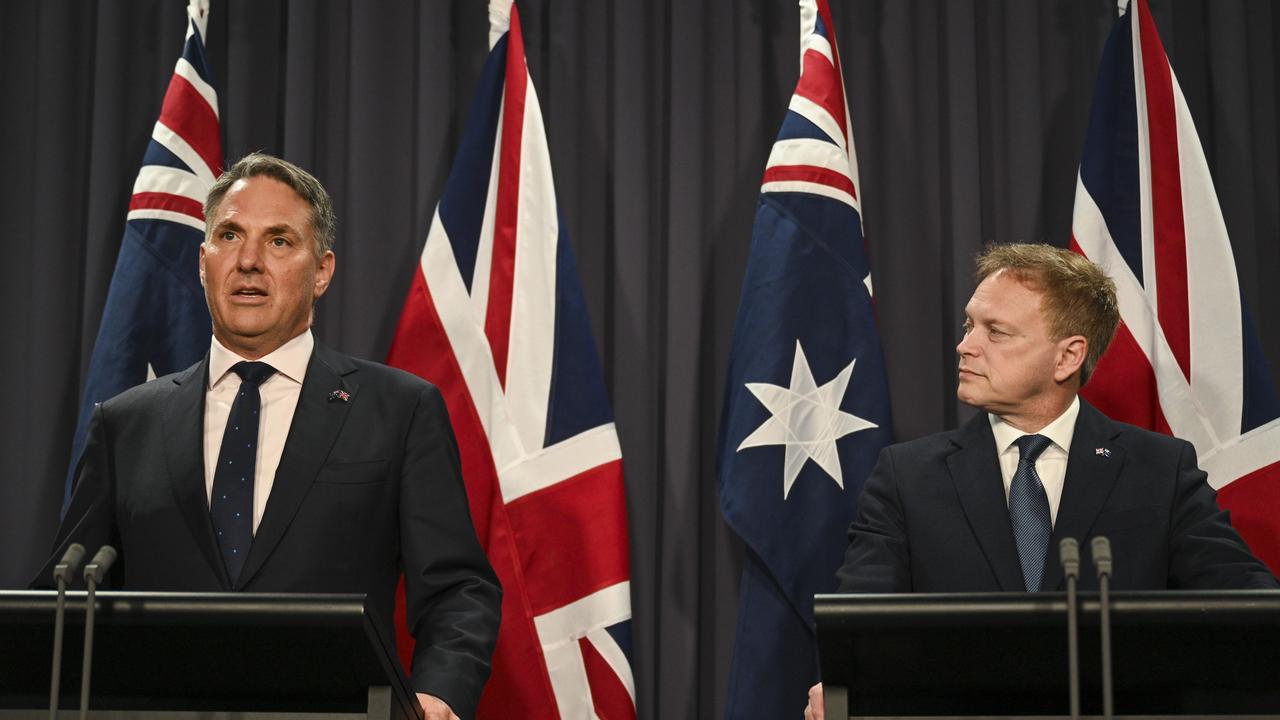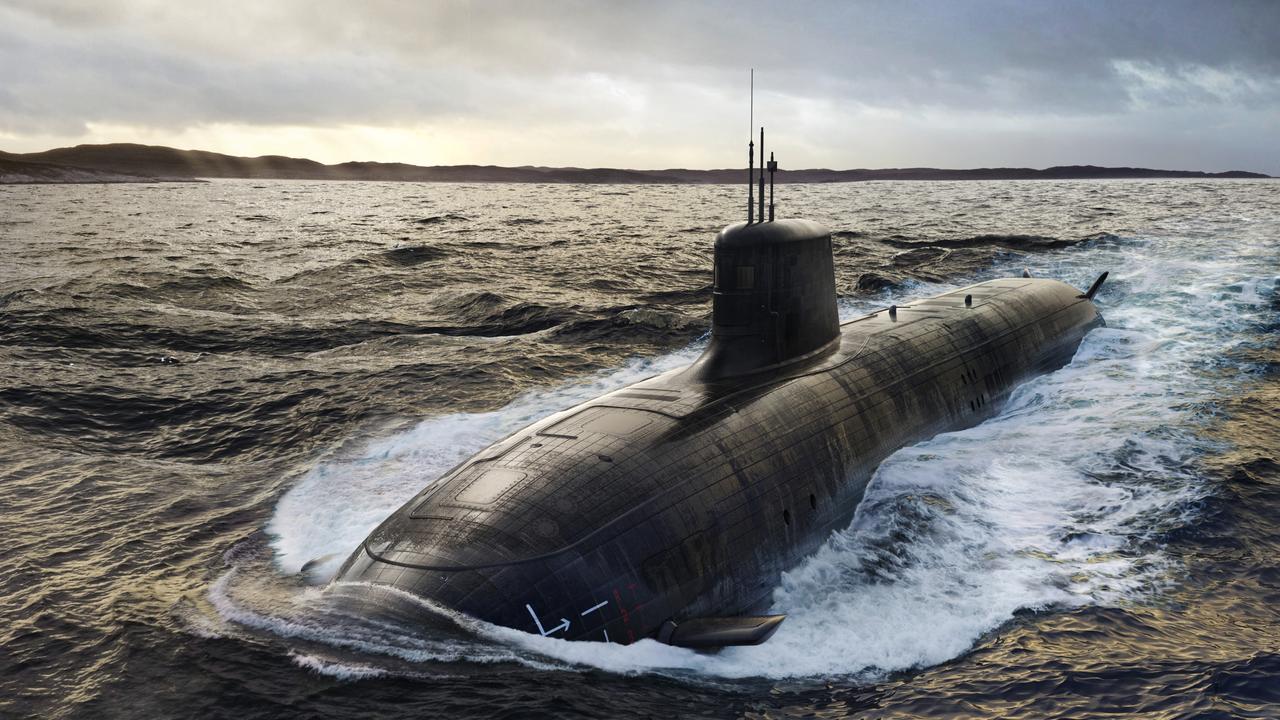Australia to send billions to UK to build nuclear reactors to power AUKUS submarines
The government has defended slugging Aussie taxpayers with a multi-billion dollar invoice for a UK company, saying it’s critical Australia contributes.
Australians will foot the $4.7bn bill to bolster the UK’s production of nuclear reactors, which the government says must be supported in order for the AUKUS submarine fleet to be delivered.
Defence Minister Richard Marles and Foreign Minister Penny Wong, alongside their UK counterparts Grant Shapps and David Cameron on Friday unveiled the crucial next steps towards the trilateral partnership.
They confirmed domestic shipbuilder ASC will partner with BAE Systems under a joint venture to build the submarines at the Osborne Naval Shipyard in Adelaide.
Mr Marles stressed that the AUKUS update came at a “very important time” amid global conflicts in Europe and the Middle East and welcomed Australia’s signing of an international agreement to send drones to Ukraine.
“We are meeting at a time where we are watching Ukraine continue its fight against the appalling Russian aggression, the appalling, unprovoked Russian invasion of its territory and as we meet today,” Mr Marles told a press conference.
“We have been proud to announce that Australia will participate in the drone coalition as part of our ongoing support for Ukraine and we really want to thank the leadership of Britain in terms of supporting Ukraine in its resistance against Russia.”

UK Foreign Secretary David Cameron said the joint discussions showed that both the UK and Australia shared concrete and clear plans of action to support Ukraine against its efforts against Russia.
He said both countries would continue to work together to send humanitarian aid to Gaza and enhance its security presence in the Indo-Pacific region.
“It is a time where friends and partners need to work even more closely together on the alliances we have and that is certainly the case with Britain and Australia, and it has certainly become clearer in these talks over the last two days,” Lord Cameron said on Friday.
The UK Defence Secretary said the AUKUS agreement, which will see Australia set aside at least $4.7bn over ten years to provide the reactors to power the SSN-AUKUS submarines, was “fundamentally” about freedom of navigation.
“AUKUS is fundamentally about freedom of navigation. About ensuring the navy and oceans are capable of being sailed freely as they should be, including here in the Indo-Pacific. Including in the South China Sea. What we are about is maintaining global world-based order. Something we hold particularly dear,” Mr Schipps said.
It’s understood some of that funding to assist UK-based Rolls Royce will also be set aside to contribute to Australia’s share of the design costs of the SSN-AUKUS, and comes in addition to the $3bn that will also be provided to the US submarine industrial base to increase sustainment and production.
The investment would be funnelled into ramping up Rolls Royce’s production lines in order to accommodate for the additional reactors required to meet Australia’s demands.
Nationals MP Barnaby Joyce said it was “beyond belief” Australia would send almost $5bn to the UK instead of building them here.
“Let’s develop our own nuclear industry,” he said.
Asked about the costings on Friday, Mr Marles said the government had been clear that nuclear reactors wouldn’t be built in Australia.
“They will be built by Rolls Royce in the UK, and once the sealed reactors are built, they will be taken here to the Osborne Naval Shipyard and placed in the submarines which will be built here,” he said.
“Building nuclear reactors is difficult to do and in order for this to play out, that facility in Derby which is building nuclear reactors for Britain’s navy, that needs to be expanded and that is what this contribution is for.
“It takes a long time to build these machines and it is important that uplift happens in the UK.”
Mr Marles said the UK’s bill paled in comparison to the investment Australia was making in its own shipbuilding industry.
“We will spend something like $30bn in building the industrial base here in Australia, which will see us be able to construct the nuclear powered submarines,” he said.
Australia will spend an estimated $8bn in infrastructure upgrades in HMAS Stirling in WA and at least $2bn to build the new Submarine Construction Yard in SA.

The design of the SSN-AUKUS fleet will be based on the UK’s Astute-class submarines and will include the US combat system.
The first of Australia’s fleet of eight submarines will come from the US before ASC and BAE commences the build in Adelaide from 2040.
BAE, which is designing and constructing the Hunter Class frigates, has long been expected to be the partner of choice for the submarine build.
In a statement, chief executive Charles Woodburn said the company was “extremely proud” of the role it would play in delivering the submarine program.
“Our selection as a partner in Australia, alongside ASC, recognises our role as the UK’s long-term submarine design and build partner and as a key player in Australia’s maritime enterprise and wider defence landscape,” he said.
“Drawing on decades of experience in the UK and Australia, we look forward to working with ASC to develop an enduring, sovereign nuclear-powered submarine building capability for Australia.”
ASC and BAE will initially form a collaborative arrangement to allow work to commence immediately, as a complex legal work for a joint venture is nutted out.
It’s understood the government wanted to avoid the legal logjam that slowed down activity on the now-scrapped French submarine program.
The government will also unveil a “train the trainer” initiative in which VET teachers will be sent to the US for international placements to learn skills to bring back to Australia.
The full cost of the AUKUS submarine program, including construction and maintenance and service, is set to reach up to $368 billion by 2055.



